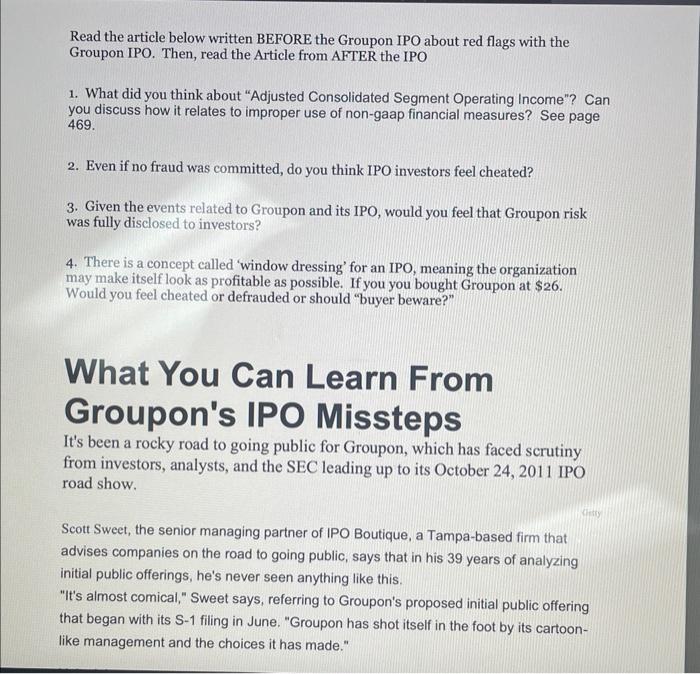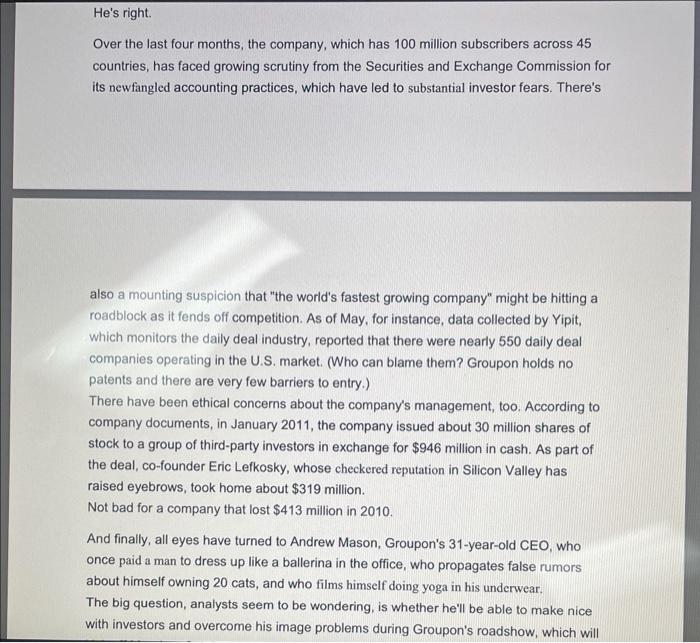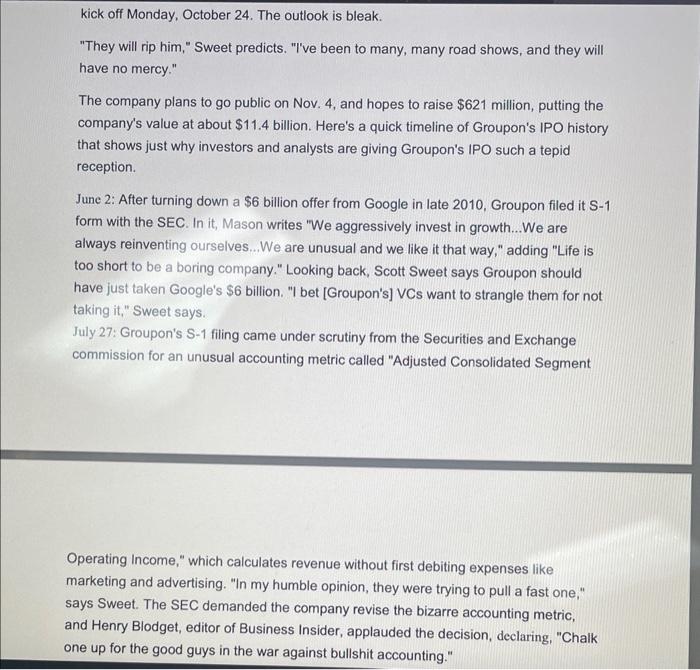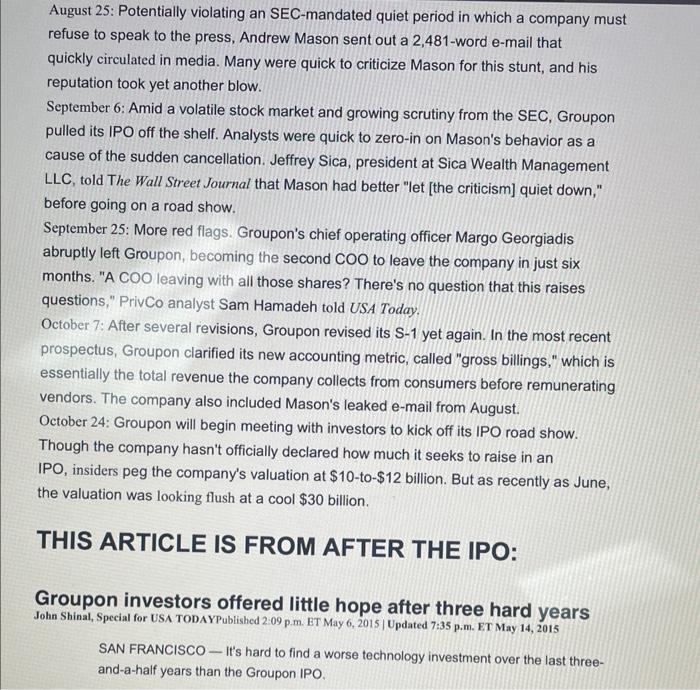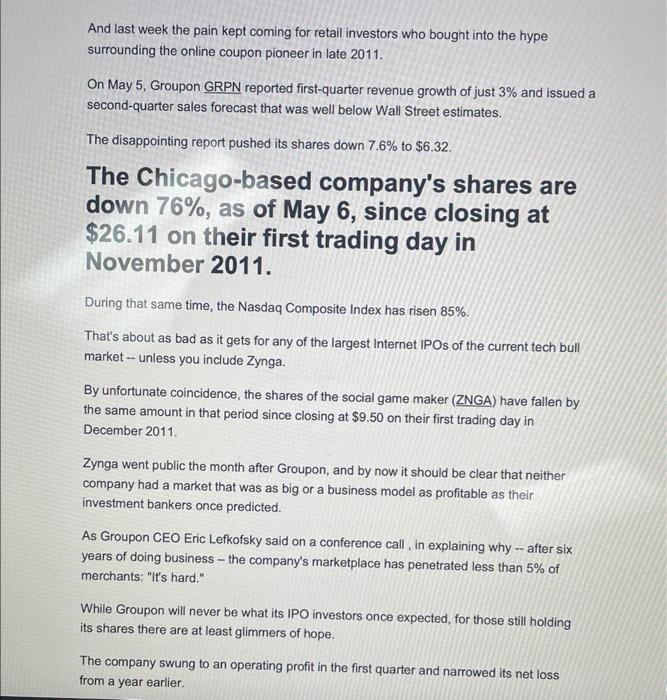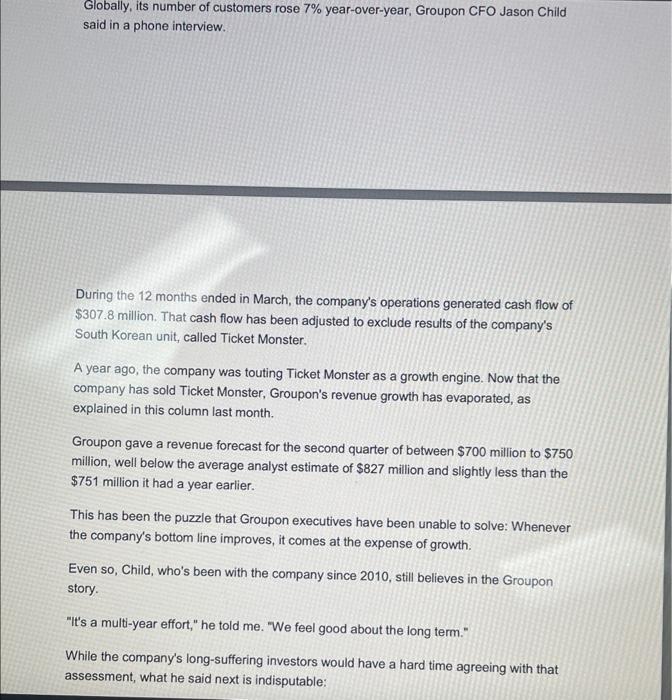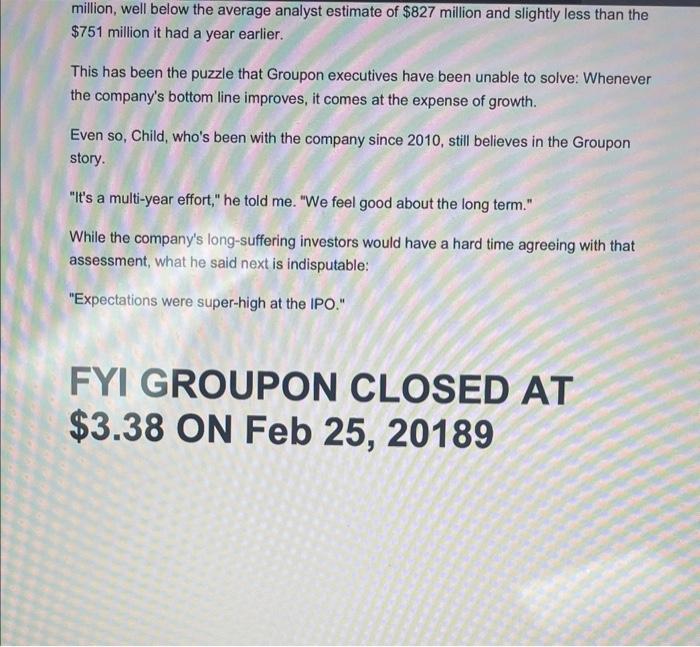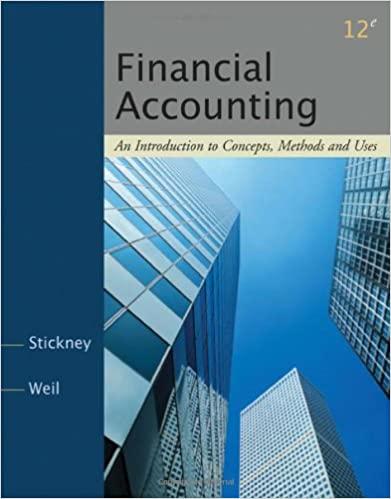Read the article below written BEFORE the Groupon IPO about red flags with the Groupon IPO. Then, read the Article from AFTER the IPO 1. What did you think about "Adjusted Consolidated Segment Operating Income"? Can you discuss how it relates to improper use of non-gaap financial measures? See page 469. 2. Even if no fraud was committed, do you think IPO investors feel cheated? 3. Given the events related to Groupon and its IPO, would you feel that Groupon risk was fully disclosed to investors? 4. There is a concept called 'window dressing' for an IPO, meaning the organization may make itself look as profitable as possible. If you you bought Groupon at \$26. Would you feel cheated or defrauded or should "buyer beware?" What You Can Learn From Groupon's IPO Missteps It's been a rocky road to going public for Groupon, which has faced scrutiny from investors, analysts, and the SEC leading up to its October 24, 2011 IPO road show. Scott Sweet, the senior managing partner of IPO Boutique, a Tampa-based firm that advises companies on the road to going public, says that in his 39 years of analyzing initial public offerings, he's never seen anything like this. "It's almost comical," Sweet says, referring to Groupon's proposed initial public offering that began with its S-1 filing in June. "Groupon has shot itself in the foot by its cartoonlike management and the choices it has made." Over the last four months, the company, which has 100 million subscribers across 45 countries, has faced growing scrutiny from the Securities and Exchange Commission for its newfangled accounting practices, which have led to substantial investor fears. There's also a mounting suspicion that "the world's fastest growing company" might be hitting a roadblock as it fends off competition. As of May, for instance, data collected by Yipit, which monitors the daily deal industry, reported that there were nearly 550 daily deal companies operating in the U.S. market. (Who can blame them? Groupon holds no patents and there are very few barriers to entry.) There have been ethical concerns about the company's management, too. According to company documents, in January 2011, the company issued about 30 million shares of stock to a group of third-party investors in exchange for $946 million in cash. As part of the deal, co-founder Eric Lefkosky, whose checkered reputation in Silicon Valley has raised eyebrows, took home about $319 million. Not bad for a company that lost $413 million in 2010. And finally, all eyes have turned to Andrew Mason, Groupon's 31-year-old CEO, who once paid a man to dress up like a ballerina in the office, who propagates false rumors about himself owning 20 cats, and who films himself doing yoga in his underwear. The big question, analysts seem to be wondering, is whether he'll be able to make nice with investors and overcome his image problems during Groupon's roadshow, which will kick off Monday, October 24. The outlook is bleak. "They will rip him," Sweet predicts. "I've been to many, many road shows, and they will have no mercy." The company plans to go public on Nov. 4 , and hopes to raise $621 million, putting the company's value at about $11.4 billion. Here's a quick timeline of Groupon's IPO history that shows just why investors and analysts are giving Groupon's IPO such a tepid reception. June 2: After turning down a $6 billion offer from Google in late 2010, Groupon filed it S-1 form with the SEC. In it, Mason writes "We aggressively invest in growth...We are always reinventing ourselves...We are unusual and we like it that way," adding "Life is too short to be a boring company." Looking back, Scott Sweet says Groupon should have just taken Google's $6 billion. "I bet [Groupon's] VCs want to strangle them for not taking it," Sweet says. July 27: Groupon's S-1 filing came under scrutiny from the Securities and Exchange commission for an unusual accounting metric called "Adjusted Consolidated Segment Operating Income," which calculates revenue without first debiting expenses like marketing and advertising. "In my humble opinion, they were trying to pull a fast one," says Sweet. The SEC demanded the company revise the bizarre accounting metric, and Henry Blodget, editor of Business Insider, applauded the decision, declaring, "Chalk one up for the good guys in the war against bullshit accounting." August 25: Potentially violating an SEC-mandated quiet period in which a company must refuse to speak to the press, Andrew Mason sent out a 2,481-word e-mail that quickly circulated in media. Many were quick to criticize Mason for this stunt, and his reputation took yet another blow. September 6: Amid a volatile stock market and growing scrutiny from the SEC, Groupon pulled its IPO off the shelf. Analysts were quick to zero-in on Mason's behavior as a cause of the sudden cancellation. Jeffrey Sica, president at Sica Wealth Management LLC, told The Wall Street Journal that Mason had better "let [the criticism] quiet down," before going on a road show. September 25: More red flags. Groupon's chief operating officer Margo Georgiadis abruptly left Groupon, becoming the second COO to leave the company in just six months. "A COO leaving with all those shares? There's no question that this raises questions," PrivCo analyst Sam Hamadeh told USA Today. October 7: After several revisions, Groupon revised its S-1 yet again. In the most recent prospectus, Groupon clarified its new accounting metric, called "gross billings," which is essentially the total revenue the company collects from consumers before remunerating vendors. The company also included Mason's leaked e-mail from August. October 24: Groupon will begin meeting with investors to kick off its IPO road show. Though the company hasn't officially declared how much it seeks to raise in an IPO, insiders peg the company's valuation at $10-to- $12 billion. But as recently as June, the valuation was looking flush at a cool $30 billion. THIS ARTICLE IS FROM AFTER THE IPO: Groupon investors offered little hope after three hard years John Shinal, Special for USA TODAYPublished 2:09 p.m. ET May 6, 2015/Updated 7:35 p.m. ET May 14, 2015 SAN FRANCISCO - It's hard to find a worse technology investment over the last threeand-a-half years than the Groupon IPO. And last week the pain kept coming for retail investors who bought into the hype surrounding the online coupon pioneer in late 2011. On May 5, Groupon GRPN reported first-quarter revenue growth of just 3% and issued a second-quarter sales forecast that was well below Wall Street estimates. The disappointing report pushed its shares down 7.6% to $6.32. The Chicago-based company's shares are down 76%, as of May 6 , since closing at $26.11 on their first trading day in November 2011. During that same time, the Nasdaq Composite Index has risen 85%. That's about as bad as it gets for any of the largest Internet IPOs of the current tech bull market - unless you include Zynga. By unfortunate coincidence, the shares of the social game maker (ZNGA) have fallen by the same amount in that period since closing at $9.50 on their first trading day in December 2011. Zynga went public the month after Groupon, and by now it should be clear that neither company had a market that was as big or a business model as profitable as their investment bankers once predicted. As Groupon CEO Eric Lefkofsky said on a conference call , in explaining why - after six years of doing business - the company's marketplace has penetrated less than 5% of merchants: "It's hard." While Groupon will never be what its IPO investors once expected, for those still holding its shares there are at least glimmers of hope. The company swung to an operating profit in the first quarter and narrowed its net loss from a year earlier. Globally, its number of customers rose 7% year-over-year, Groupon CFO Jason Child said in a phone interview. During the 12 months ended in March, the company's operations generated cash flow of $307.8 million. That cash flow has been adjusted to exclude results of the company's South Korean unit, called Ticket Monster. A year ago, the company was touting Ticket Monster as a growth engine. Now that the company has sold Ticket Monster, Groupon's revenue growth has evaporated, as explained in this column last month. Groupon gave a revenue forecast for the second quarter of between $700 million to $750 million, well below the average analyst estimate of $827 million and slightly less than the $751 million it had a year earlier. This has been the puzzle that Groupon executives have been unable to solve: Whenever the company's bottom line improves, it comes at the expense of growth. Even so, Child, who's been with the company since 2010 , still believes in the Groupon story. "It's a multi-year effort," he told me. "We feel good about the long term." While the company's long-suffering investors would have a hard time agreeing with that assessment, what he said next is indisputable: million, well below the average analyst estimate of $827 million and slightly less than the $751 million it had a year earlier. This has been the puzzle that Groupon executives have been unable to solve: Whenever the company's bottom line improves, it comes at the expense of growth. Even so, Child, who's been with the company since 2010, still believes in the Groupon story. "It's a multi-year effort," he told me. "We feel good about the long term." While the company's long-suffering investors would have a hard time agreeing with that assessment, what he said next is indisputable: "Expectations were super-high at the IPO." FYI GROUPON CLOSED AT $3.38 ON Feb 25, 20189 Read the article below written BEFORE the Groupon IPO about red flags with the Groupon IPO. Then, read the Article from AFTER the IPO 1. What did you think about "Adjusted Consolidated Segment Operating Income"? Can you discuss how it relates to improper use of non-gaap financial measures? See page 469. 2. Even if no fraud was committed, do you think IPO investors feel cheated? 3. Given the events related to Groupon and its IPO, would you feel that Groupon risk was fully disclosed to investors? 4. There is a concept called 'window dressing' for an IPO, meaning the organization may make itself look as profitable as possible. If you you bought Groupon at \$26. Would you feel cheated or defrauded or should "buyer beware?" What You Can Learn From Groupon's IPO Missteps It's been a rocky road to going public for Groupon, which has faced scrutiny from investors, analysts, and the SEC leading up to its October 24, 2011 IPO road show. Scott Sweet, the senior managing partner of IPO Boutique, a Tampa-based firm that advises companies on the road to going public, says that in his 39 years of analyzing initial public offerings, he's never seen anything like this. "It's almost comical," Sweet says, referring to Groupon's proposed initial public offering that began with its S-1 filing in June. "Groupon has shot itself in the foot by its cartoonlike management and the choices it has made." Over the last four months, the company, which has 100 million subscribers across 45 countries, has faced growing scrutiny from the Securities and Exchange Commission for its newfangled accounting practices, which have led to substantial investor fears. There's also a mounting suspicion that "the world's fastest growing company" might be hitting a roadblock as it fends off competition. As of May, for instance, data collected by Yipit, which monitors the daily deal industry, reported that there were nearly 550 daily deal companies operating in the U.S. market. (Who can blame them? Groupon holds no patents and there are very few barriers to entry.) There have been ethical concerns about the company's management, too. According to company documents, in January 2011, the company issued about 30 million shares of stock to a group of third-party investors in exchange for $946 million in cash. As part of the deal, co-founder Eric Lefkosky, whose checkered reputation in Silicon Valley has raised eyebrows, took home about $319 million. Not bad for a company that lost $413 million in 2010. And finally, all eyes have turned to Andrew Mason, Groupon's 31-year-old CEO, who once paid a man to dress up like a ballerina in the office, who propagates false rumors about himself owning 20 cats, and who films himself doing yoga in his underwear. The big question, analysts seem to be wondering, is whether he'll be able to make nice with investors and overcome his image problems during Groupon's roadshow, which will kick off Monday, October 24. The outlook is bleak. "They will rip him," Sweet predicts. "I've been to many, many road shows, and they will have no mercy." The company plans to go public on Nov. 4 , and hopes to raise $621 million, putting the company's value at about $11.4 billion. Here's a quick timeline of Groupon's IPO history that shows just why investors and analysts are giving Groupon's IPO such a tepid reception. June 2: After turning down a $6 billion offer from Google in late 2010, Groupon filed it S-1 form with the SEC. In it, Mason writes "We aggressively invest in growth...We are always reinventing ourselves...We are unusual and we like it that way," adding "Life is too short to be a boring company." Looking back, Scott Sweet says Groupon should have just taken Google's $6 billion. "I bet [Groupon's] VCs want to strangle them for not taking it," Sweet says. July 27: Groupon's S-1 filing came under scrutiny from the Securities and Exchange commission for an unusual accounting metric called "Adjusted Consolidated Segment Operating Income," which calculates revenue without first debiting expenses like marketing and advertising. "In my humble opinion, they were trying to pull a fast one," says Sweet. The SEC demanded the company revise the bizarre accounting metric, and Henry Blodget, editor of Business Insider, applauded the decision, declaring, "Chalk one up for the good guys in the war against bullshit accounting." August 25: Potentially violating an SEC-mandated quiet period in which a company must refuse to speak to the press, Andrew Mason sent out a 2,481-word e-mail that quickly circulated in media. Many were quick to criticize Mason for this stunt, and his reputation took yet another blow. September 6: Amid a volatile stock market and growing scrutiny from the SEC, Groupon pulled its IPO off the shelf. Analysts were quick to zero-in on Mason's behavior as a cause of the sudden cancellation. Jeffrey Sica, president at Sica Wealth Management LLC, told The Wall Street Journal that Mason had better "let [the criticism] quiet down," before going on a road show. September 25: More red flags. Groupon's chief operating officer Margo Georgiadis abruptly left Groupon, becoming the second COO to leave the company in just six months. "A COO leaving with all those shares? There's no question that this raises questions," PrivCo analyst Sam Hamadeh told USA Today. October 7: After several revisions, Groupon revised its S-1 yet again. In the most recent prospectus, Groupon clarified its new accounting metric, called "gross billings," which is essentially the total revenue the company collects from consumers before remunerating vendors. The company also included Mason's leaked e-mail from August. October 24: Groupon will begin meeting with investors to kick off its IPO road show. Though the company hasn't officially declared how much it seeks to raise in an IPO, insiders peg the company's valuation at $10-to- $12 billion. But as recently as June, the valuation was looking flush at a cool $30 billion. THIS ARTICLE IS FROM AFTER THE IPO: Groupon investors offered little hope after three hard years John Shinal, Special for USA TODAYPublished 2:09 p.m. ET May 6, 2015/Updated 7:35 p.m. ET May 14, 2015 SAN FRANCISCO - It's hard to find a worse technology investment over the last threeand-a-half years than the Groupon IPO. And last week the pain kept coming for retail investors who bought into the hype surrounding the online coupon pioneer in late 2011. On May 5, Groupon GRPN reported first-quarter revenue growth of just 3% and issued a second-quarter sales forecast that was well below Wall Street estimates. The disappointing report pushed its shares down 7.6% to $6.32. The Chicago-based company's shares are down 76%, as of May 6 , since closing at $26.11 on their first trading day in November 2011. During that same time, the Nasdaq Composite Index has risen 85%. That's about as bad as it gets for any of the largest Internet IPOs of the current tech bull market - unless you include Zynga. By unfortunate coincidence, the shares of the social game maker (ZNGA) have fallen by the same amount in that period since closing at $9.50 on their first trading day in December 2011. Zynga went public the month after Groupon, and by now it should be clear that neither company had a market that was as big or a business model as profitable as their investment bankers once predicted. As Groupon CEO Eric Lefkofsky said on a conference call , in explaining why - after six years of doing business - the company's marketplace has penetrated less than 5% of merchants: "It's hard." While Groupon will never be what its IPO investors once expected, for those still holding its shares there are at least glimmers of hope. The company swung to an operating profit in the first quarter and narrowed its net loss from a year earlier. Globally, its number of customers rose 7% year-over-year, Groupon CFO Jason Child said in a phone interview. During the 12 months ended in March, the company's operations generated cash flow of $307.8 million. That cash flow has been adjusted to exclude results of the company's South Korean unit, called Ticket Monster. A year ago, the company was touting Ticket Monster as a growth engine. Now that the company has sold Ticket Monster, Groupon's revenue growth has evaporated, as explained in this column last month. Groupon gave a revenue forecast for the second quarter of between $700 million to $750 million, well below the average analyst estimate of $827 million and slightly less than the $751 million it had a year earlier. This has been the puzzle that Groupon executives have been unable to solve: Whenever the company's bottom line improves, it comes at the expense of growth. Even so, Child, who's been with the company since 2010 , still believes in the Groupon story. "It's a multi-year effort," he told me. "We feel good about the long term." While the company's long-suffering investors would have a hard time agreeing with that assessment, what he said next is indisputable: million, well below the average analyst estimate of $827 million and slightly less than the $751 million it had a year earlier. This has been the puzzle that Groupon executives have been unable to solve: Whenever the company's bottom line improves, it comes at the expense of growth. Even so, Child, who's been with the company since 2010, still believes in the Groupon story. "It's a multi-year effort," he told me. "We feel good about the long term." While the company's long-suffering investors would have a hard time agreeing with that assessment, what he said next is indisputable: "Expectations were super-high at the IPO." FYI GROUPON CLOSED AT $3.38 ON Feb 25, 20189
